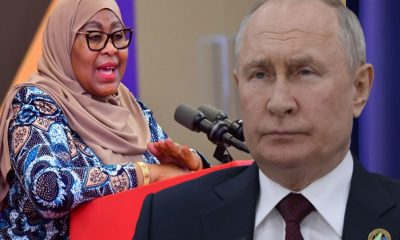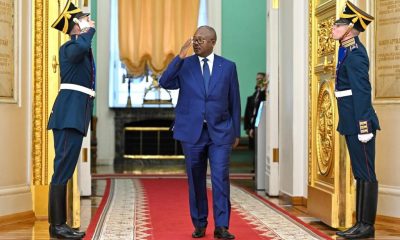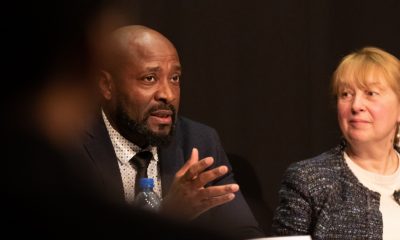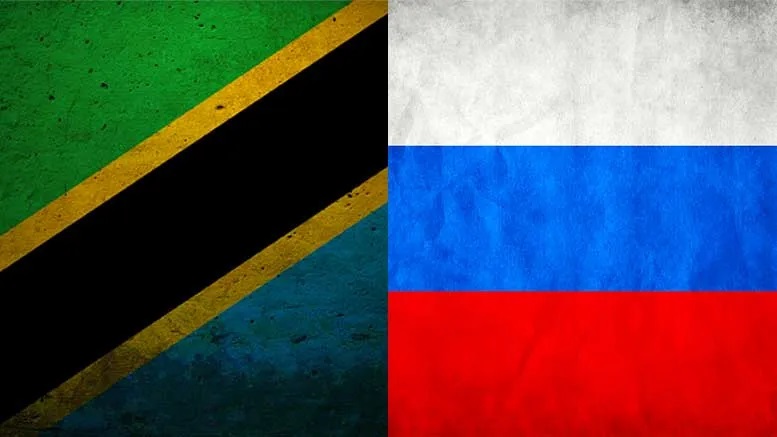World
Reassessing Russia’s Engagement with Zimbabwe
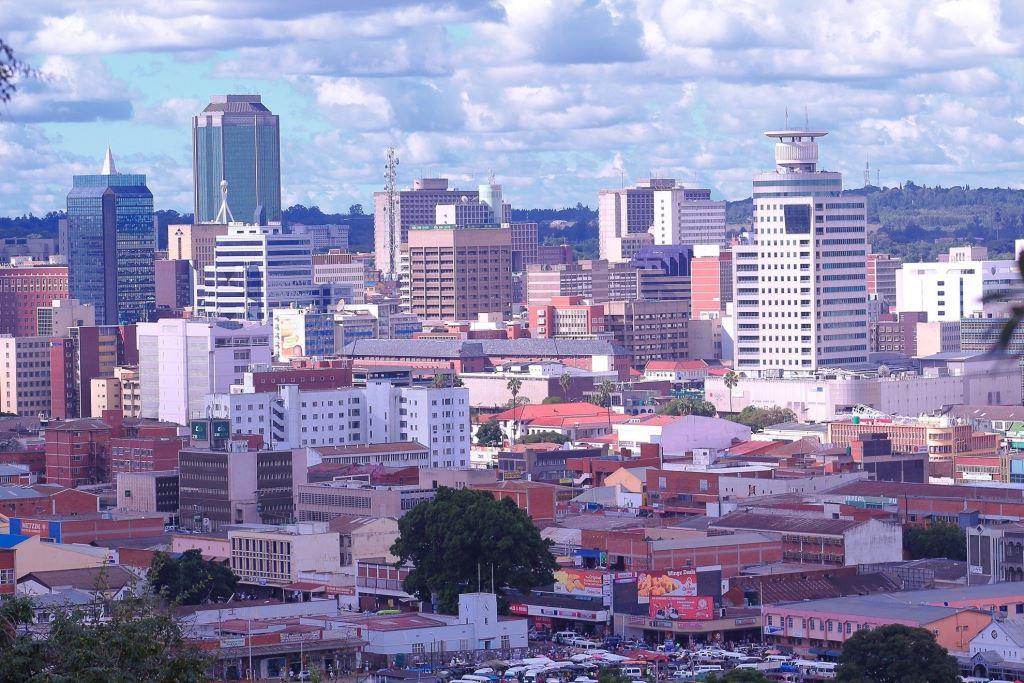
By Kestér Kenn Klomegâh
As often reiterated, Russia and Zimbabwe have had excellent bilateral relations, dating from the time of Zimbabwe’s struggle for political independence. The Soviet Union supported with military equipment, and training specialists and offered humanitarian supplies, and until today Zimbabwe is still looking for such bilateral relations. A comprehensive analysis indicates that not much is visible on the landscape of Zimbabwe, except frequent shuttling visits of government officials between Harare and Moscow.
The list of those official visits can be found on government websites. Of course, not all have been documented there such as those dealing with military-technical cooperation and intelligence services. But it can also be recalled here in 2022, Speaker of the National Assembly of the Republic of Zimbabwe Jacob Mudenda and his delegation paid a reciprocal working visit late September to Moscow, held separate meetings with Russian Upper House Speaker Valentina Matviyenko and Chairman of the State Duma Vyacheslav Volodin, and finally addressed the plenary session of the State Duma.
Upper Chamber Senator Matviyenko and Lower Chamber Legislator Volodin, both have similar unique declaratory statements emphasizing the fact that Russia considers cooperation with African countries to be a foreign policy priority. And that Zimbabwe is Russia’s priority in the southern African region.
Upper House Speaker Valentina Matviyenko visited and donated, as Zimbabweans expected from Moscow, huge gifts in June 2022. During her conversation with the head of the charitable foundation and First Lady of the Republic of Zimbabwe Auxilia Mnangagwa Matviyenko noted mutual understanding that has developed in Russian-Zimbabwean relations. She, in addition, drew attention to the fact that the Angels of Hope charity fund coordinates the selection of candidates from low-income families for higher education in Russia under the quota of the Government of the Russian Federation.
“We highly appreciate it that the Zimbabwean leadership remains committed to the development of bilateral relations and mutually beneficial cooperation with Russia. And that Zimbabwe is resolutely resisting the unprecedented pressure of the collective West led by the United States, their open attempts to dictate their will,” Matviyenko said.
Besides the above charity, the Russia-Zimbabwe Intergovernmental Commission on Economic, Scientific and Technical Cooperation has held a series of meetings in Harare and Moscow. Several agreements have been signed over the years to engage seriously in economic sectors, including, infrastructure development, transport, agriculture, industry nuclear technology et cetera. An increasing interest points to the Russian business community in building a beneficial partnership with Zimbabwe. For these to materialize, frequent interactions have been made possible, based on decades of strong ties of friendship and cooperation since the days of Zimbabwean Robert Mugabe.
One major landmark was Zimbabwe and Ethiopia, among African countries, have signed agreements with Russia to cooperate on the peaceful use of nuclear technology on the sidelines of the Russia-Africa Economic and Humanitarian Forum in St Petersburg, in July 2023. Rosatom has offices in Cairo and Pretoria with the responsibility of managing the nuclear projects in Africa.
For decades, Rosatom has signed (and resigned) agreements with African countries for the construction of nuclear plants for civilian purposes. Today, African countries face major challenges in ensuring energy security. Experts believe that nuclear technologies can become a driver for socio-economic development and a comprehensive solution to systemic continent-wide problems. In addition, nuclear, of course, offers long-term sustainability and diversity away from solar and hydro.
These unique steps seemingly suggest a pragmatic approach prioritizing Africa’s energy security, on one hand. It is interesting to note, on the other hand, that Russia’s nuclear agreements with 28 African countries have been fully undertaken and completed primarily due to a lack of finance. The key hindrance is the cost of producing nuclear energy how best to deal with nuclear waste to maintain a safe environment, and the risk that it poses from poor handling and management. After the first Russia-Africa summit held in 2019, Russia has, as an exceptional case, granted a $29 billion loan for the nuclear plant construction in Egypt based on its strategic bilateral relations. The nuclear agreement was signed as far back as 2015.
President of the Republic of Zimbabwe, Emmerson Dambudzo Mnangagwa, since the beginning of the Russia-Ukraine crisis and the ‘special military operation’ aims at denazifying and demilitarizing Ukraine, has utterly rejected the United States’ appeal to support sanctions against Russia. It has, therefore, won Russia’s sympathy as a ‘friendly’ African ally. In return, Zimbabwe was given in late 2023 what was termed ‘delivery at no-cost’ grains and fertilizers, these were in addition to supplies of military equipment and training of Zimbabwean citizens on state budget at educational institutions in the Russian Federation. According to the official statistics, there are currently 400 Zimbabweans studying in the Russian Federation.
Mnangagwa, while visiting as a guest speaker at the 27th St. Petersburg International Economic Forum (SPIEF) and his special meeting with President Vladimir Putin in June 2024, was excited at winning favours by explaining, at length, how the United States has been supporting neighbouring southern African countries. Ultimately, Mnangagwa was to get better treatment for a broader supply of arms and weaponry, and food to feed the impoverished population. He did not negotiate for investment in agriculture, he did not suggest the construction of, at least, a kilometre road or a local school in any of the rural regions in Zimbabwe.
What was important for Zimbabwe, Mnangagwa asked for the chance to enhance bilateral cooperation, and that Zimbabwe is “one of the few countries in southern Africa that is regarded as anti-West” so there is a concrete basis for pursuing more consolidated relations to escape being further isolated in southern Africa. “And there is a lot more that we can open for the Russian Federation to participate in our economy, especially in the mining sector and agriculture,” he stressed in his discussion.
Russia’s perspectives on the struggle against growing neo-colonialism and Western-style tendencies, most probably, have to do with pushing for large-scale development programmes, and support for attaining economic sovereignty. If that is the case, then Russia needs to borrow a single page from China. Zimbabwe has the full-fledged confidence to opt for hosting the third Russia-Africa Summit in Harare simply because China has given that country a new parliamentary village with modern facilities for large conferences. Compared, Russia has not constructed a single one-kilometre road in the transport sector in Zimbabwe consistently claims to have under its umbrella excellent relations from the Soviet times.
The new parliament building is located in Mount Hampden, approximately 25 kilometres (16 mi) northwest of Harare. The parliamentary chambers can accommodate up to 650 legislators, their offices, conference rooms and meeting spaces. The engineering, procurement and construction (EPC) contract was awarded to Shanghai Construction Group, which erected the building between December 2018 and April 2022. A Chinese government delegation officially handed over the building complex to the government of Zimbabwe on 26 October 2023. The construction was fully funded at the cost of nearly $200 million by the Government of China, according to reports by Zimbabwean media.
Perhaps generally, Russia aspires to position itself as a leader in Africa, it thus far remains with its aspirations in the media headlines. Uprooting neo-colonialism requires investment in building economic sectors designed to improve the living standards of the impoverished population, creating employment for the youth. Russia’s footprints, such as providing infrastructure in agriculture, industry, transport and other sectors, are invisible in the continent. The fundamental conservative assessment indicates that Africa is largely at the bottom position in terms of overall development in the southern hemisphere, what is now called the Global South.
Russia is gathering the Global South as a force against the United States and Western Europe. Africa has been given all kinds of descriptions, one being having “unparalleled natural wealth and boundless potentials,” and by this definition, Russia has to determine its proposed commitment to driving economic diversification, transformation and development across the African continent. That, however, its rhetoric has reached the highest peak of the African mountains.
Zimbabwe has the world’s second-largest platinum reserves after South Africa. Russia declared interest in the development of a platinum deposit in Darwendale. Several reports later confirmed that Russians had abandoned their lucrative platinum project contract that was signed for $3 billion in September 2014, the platinum mine in the sun-scorched location about 50 km northwest of Harare, the Zimbabwean capital. With great pomp and pageantry, Foreign Minister Sergey Lavrov launched the $3 billion Russian project back in 2014, after years of negotiations, with the hope of raising its economic profile in Zimbabwe.
Reports also indicated that the project was expected to involve a consortium consisting of the Rostekhnologii State Corporation, Vneshekonombank and Vi Holding in a joint venture with some private Zimbabwe investors as well as the Zimbabwean government.
Mnangagwa has been committed to opening up Zimbabwe’s economy to the rest of the world to attract the much-needed foreign direct investment to revive the ailing economy and make maximum use of the opportunities for bolstering and implementing some large projects in the country. That Zimbabwe would undergo a “painful” reform process to achieve transformation and modernization of the economy.
Zimbabwe has various potential investment sectors besides mining. There is a possibility of greater participation of Russian economic operators in the development processes in Zimbabwe, and southern Africa. But Russians need to move away from too much rhetoric and make concrete economic engagement over the forthcoming years.
Zimbabwe, a landlocked country in southern Africa, shares a 200-kilometre border on the south with South Africa, bounded on the southwest and west by Botswana, on the north by Zambia and the northeast and east by Mozambique. Zimbabwe is a member of the Southern African Development Community (SADC).
World
African Visual Art is Distinguished by Colour Expression, Dynamic Form—Kalalb

By Kestér Kenn Klomegâh
In this insightful interview, Natali Kalalb, founder of NAtali KAlalb Art Gallery, discusses her practical experiences of handling Africa’s contemporary arts, her professional journey into the creative industry and entrepreneurship, and also strategies of building cultural partnership as a foundation for Russian-African bilateral relations. Here are the interview excerpts:
Given your experience working with Africa, particularly in promoting contemporary art, how would you assess its impact on Russian-African relations?
Interestingly, my professional journey in Africa began with the work “Afroprima.” It depicted a dark-skinned ballerina, combining African dance and the Russian academic ballet tradition. This painting became a symbol of cultural synthesis—not opposition, but dialogue.
Contemporary African art is rapidly strengthening its place in the world. By 2017, the market was growing so rapidly that Sotheby launched its first separate African auction, bringing together 100 lots from 60 artists from 14 foreign countries, including Algeria, Ghana, Mali, Nigeria, Senegal, and others. That same year during the Autumn season, Louis Vuitton Foundation in Paris hosted a major exhibition dedicated to African art. According to Artnet, sales of contemporary African artists reached $40 million by 2021, a 434% increase in just two years. Today, Sotheby holds African auctions twice a year, and in October 2023, they raised $2.8 million.
In Russia, this process manifests itself through cultural dialogue: exhibitions, studios, and educational initiatives create a space of trust and mutual respect, shaping the understanding of contemporary African art at the local level.
Do you think geopolitical changes are affecting your professional work? What prompted you to create an African art studio?
The international context certainly influences cultural processes. However, my decision to work with African themes was not situational. I was drawn to the expressiveness of African visual language—colour, rhythm, and plastic energy. This theme is practically not represented systematically and professionally in the Russian art scene.
The creation of the studio was a step toward establishing a sustainable platform for cultural exchange and artistic dialogue, where the works of African artists are perceived as a full-fledged part of the global cultural process, rather than an exotic one.
To what extent does African art influence Russian perceptions?
Contemporary African art is gradually changing the perception of the continent. While previously viewed superficially or stereotypically, today viewers are confronted with the depth of artistic expression and the intellectual and aesthetic level of contemporary artists.
Portraits are particularly impactful: they allow us to see not just an abstract image of a “continent,” but a concrete personality, character, and inner dignity. Global market growth data and regular auctions create additional trust in African contemporary art and contribute to its perception as a mature and valuable movement.
Does African art reflect lifestyle and fashion? How does it differ from Russian art?
African art, in my opinion, is at its peak in everyday culture—textiles, ornamentation, bodily movement, rhythm. It interacts organically with fashion, music, interior design, and the urban environment. The Russian artistic tradition is historically more academic and philosophical. African visual art is distinguished by greater colour expression and dynamic form. Nevertheless, both cultures are united by a profound symbolic and spiritual component.
What feedback do you receive on social media?
Audience reactions are generally constructive and engaging. Viewers ask questions about cultural codes, symbolism, and the choice of subjects. The digital environment allows for a diversity of opinions, but a conscious interest and a willingness to engage in cultural dialogue are emerging.
What are the key challenges and achievements of recent years?
Key challenges:
- Limited expert base on African contemporary art in Russia;
- Need for systematic educational outreach;
- Overcoming the perception of African art as exclusively decorative or ethnic.
Key achievements:
- Building a sustainable audience;
- Implementing exhibition and studio projects;
- Strengthening professional cultural interaction and trust in African
contemporary art as a serious artistic movement.
What are your future prospects in the context of cultural diplomacy?
Looking forward, I see the development of joint exhibitions, educational programs, and creative residencies. Cultural diplomacy is a long-term process based on respect and professionalism. If an artistic image is capable of uniting different cultural traditions in a single visual space, it becomes a tool for mutual understanding.
World
Ukraine Reveals Identities of Nigerians Killed Fighting for Russia

By Adedapo Adesanya
The Ukrainian Defence Intelligence (UDI) has identified two Nigerian men, Mr Hamzat Kazeem Kolawole and Mr Mbah Stephen Udoka, allegedly killed while fighting as Russian mercenaries in the war between the two countries ongoing since February 2022.
The development comes after Russia denied knowledge of Nigerians being recruited to fight on the frontlines.
Earlier this week, the Russian Ambassador to Nigeria, Mr Andrey Podyolyshev, said in Abuja that he was not aware of any government-backed programme to recruit Nigerians to fight in the war in Ukraine.
He said if at all such activity existed, it is not connected with the Russian state.
However, in a statement on Thursday, the Ukrainian Defence released photographs of Nigerians killed while defending Russia.
“In the Luhansk region, military intelligence operatives discovered the bodies of two citizens of the Federal Republic of Nigeria — Hamzat Kazeen Kolawole (03.04.1983) and Mbah Stephen Udoka (07.01.1988),” the statement read.
According to the statement, both men served in the 423rd Guards Motor Rifle Regiment (military unit 91701) of the 4th Guards Kantemirovskaya Tank Division of the armed forces of the Russian Federation.
UDI said that they signed contracts with the Russian Army in the second half of 2025 – the deceased Mr Kolawole on August 29 and Mr Udoka on September 28.
“Udoka received no training whatsoever — just five days later, on October 3, he was assigned to the unit and sent to the temporarily occupied territories of Ukraine,” the report read.
It added that no training records for Mr Kolawole have been preserved; however, it is highly likely that he also received no military training, but his wife and three children remain in Nigeria.
Both Nigerians, the report added, were killed in late November during an attempt to storm Ukrainian positions in the Luhansk region.
“They never engaged in a firefight — the mercenaries were eliminated by a drone strike,” UDI stated, warning foreign citizens against travelling to the Russian Federation or taking up any work on the territory of the “aggressor state”.
“A trip to Russia is a real risk of being forced into a suicide assault unit and, ultimately, rotting in Ukrainian soil,” the statement read.
In an investigation earlier this month, CNN reported that hundreds of African men have been enticed to fight for Russia in Ukraine with the promise of civilian jobs and high salaries. However, the media organisation uncovered that they are being deceived or sent to the front lines with little combat training.
CNN said it reviewed hundreds of chats on messaging apps, military contracts, visas, flights and hotel bookings, as well as gathering first-hand accounts from African fighters in Ukraine, to understand just how Russia entices African men to bolster its ranks.
World
Today’s Generation of Entrepreneurs Value Flexibility, Autonomy—McNeal-Weary

By Kestér Kenn Klomegâh
The Young African Leaders Initiative (YALI) is the United States’ signature step to invest in the next generation of African leaders. Since its establishment in 2010 by Obama administration, YALI has offered diverse opportunities, including academic training in leadership, governance skills, organizational development and entrepreneurship, and has connected with thousands of young leaders across Africa. This United States’ policy collaboration benefits both America and Africa by creating stronger partnerships, enhancing mutual prosperity, and ensuring a more stable environment.
In our conversation, Tonya McNeal-Weary, Managing Director at IBS Global Consulting, Inc., Global Headquarters in Detroit, Michigan, has endeavored to discuss, thoroughly, today’s generation of entrepreneurs and also building partnerships as a foundation for driving positive change and innovation in the global marketplace. Here are the excerpts of her conversation:
How would you describe today’s generation of entrepreneurs?
I would describe today’s generation of entrepreneurs as having a digital-first mindset and a fundamental belief that business success and social impact can coexist. Unlike the entrepreneurs before them, they’ve grown up with the internet as a given, enabling them to build global businesses from their laptops and think beyond geographic constraints from day one. They value flexibility and autonomy, often rejecting traditional corporate ladders in favor of building something meaningful on their own terms, even if it means embracing uncertainty and financial risk that previous generations might have avoided.
And those representing the Young African Leaders Initiative, who attended your webinar presentation late January 2026?
The entrepreneurs representing the Young African Leaders Initiative are redefining entrepreneurship on the continent by leveraging their unique perspectives, cultural heritage, and experiences. Their ability to innovate within local contexts while connecting to global opportunities exemplifies how the new wave of entrepreneurs is not confined by geography or conventional expectations.
What were the main issues that formed your ‘lecture’ with them, Young African Leaders Initiative?
The main issues that formed my lecture for the Young African Leaders Initiative were driven by understanding the importance of building successful partnerships when expanding into the United States or any foreign market. During my lecture, I emphasized that forming strategic alliances can help entrepreneurs navigate unfamiliar business environments, access new resources, and foster long-term growth. By understanding how to establish strong and effective partnerships, emerging leaders can position their businesses for sustainable success in global markets. I also discussed the critical factors that contribute to successful partnerships, such as establishing clear communication channels, aligning on shared goals, and cultivating trust between all parties involved. Entrepreneurs must be proactive in seeking out partners who complement their strengths and fill gaps in expertise or resources. It is equally important to conduct thorough due diligence to ensure that potential collaborators share similar values and ethical standards. Ultimately, the seminar aimed to empower YALI entrepreneurs with practical insights and actionable strategies for forging meaningful connections across borders. Building successful partnerships is not only a pathway to business growth but also a foundation for driving positive change and innovation in the global marketplace.
What makes a ‘leader’ today, particularly, in the context of the emerging global business architecture?
In my opinion, a leader in today’s emerging global business architecture must navigate complexity and ambiguity with a fundamentally different skill set than what was previously required. Where traditional leadership emphasized command-and-control and singular vision, contemporary leaders succeed through adaptive thinking and collaborative influence across decentralized networks. Furthermore, emotional intelligence has evolved from a soft skill to a strategic imperative. Today, the effective modern leader must possess deep cross-cultural intelligence, understanding that global business is no longer about exporting one model worldwide but about genuinely integrating diverse perspectives and adapting to local contexts while maintaining coherent values.
Does multinational culture play in its (leadership) formation?
I believe multinational culture plays a profound and arguably essential role in forming the kind of leadership required in today’s global business environment. Leaders who have lived, worked, or deeply engaged across multiple cultural contexts develop a cognitive flexibility that’s difficult to replicate through reading or training alone. More importantly, multinational exposure tends to dismantle the unconscious certainty that one’s own way of doing things is inherently “normal” or “best.” Leaders shaped in multicultural environments often develop a productive discomfort with absolutes; they become more adept at asking questions, seeking input, and recognizing blind spots. This humility and curiosity become strategic assets when building global teams, entering new markets, or navigating geopolitical complexity. However, it’s worth noting that multinational experience alone doesn’t automatically create great leaders. What matters is the depth and quality of cross-cultural engagement, not just the passport stamps. The formation of global leadership is less about where someone has been and more about whether they’ve developed the capacity to see beyond their own cultural lens and genuinely value differences as a source of insight rather than merely tolerating them as an obstacle to overcome.
In the context of heightening geopolitical situation, and with Africa, what would you say, in terms of, people-to-people interaction?
People-to-people interaction is critically important in the African business context, particularly as geopolitical competition intensifies on the continent. In this crowded and often transactional landscape, the depth and authenticity of human relationships can determine whether a business venture succeeds or fails. I spoke on this during my presentation. When business leaders take the time for face-to-face meetings, invest in understanding local priorities rather than imposing external agendas, and build relationships beyond the immediate transaction, they signal a different kind of partnership. The heightened geopolitical situation actually makes this human dimension more vital, not less. As competition increases and narratives clash about whose model of development is best, the businesses and nations that succeed in Africa will likely be those that invest in relationships characterized by reciprocity, respect, and long-term commitment rather than those pursuing quick wins.
How important is it for creating public perception and approach to today’s business?
Interaction between individuals is crucial for shaping public perception, as it influences views in ways that formal communications cannot. We live in a society where word-of-mouth, community networks, and social trust areincredibly important. As a result, a business leader’s behavior in personal interactions, their respect for local customs, their willingness to listen, and their follow-through on commitments have a far-reaching impact that extends well beyond the immediate meeting. The geopolitical dimension amplifies this importance because African nations now have choices. They’re no longer dependent on any single partner and can compare approaches to business.
From the above discussions, how would you describe global business in relation to Africa? Is it directed at creating diverse import dependency?
While it would be too simplistic to say global business is uniformly directed at creating import dependency, the structural patterns that have emerged often produce exactly that outcome, whether by design or as a consequence of how global capital seeks returns. Global financial institutions and trade agreements have historically encouraged African nations to focus on their “comparative advantages” in primary commodities rather than industrial development. The critical question is whether global business can engage with Africa in ways that build productive capacity, transfer technology, develop local talent, and enable countries to manufacture for themselves and for export—or whether the economic incentives and power irregularities make this structurally unlikely without deliberate policy intervention.
-

 Feature/OPED6 years ago
Feature/OPED6 years agoDavos was Different this year
-
Travel/Tourism10 years ago
Lagos Seals Western Lodge Hotel In Ikorodu
-

 Showbiz3 years ago
Showbiz3 years agoEstranged Lover Releases Videos of Empress Njamah Bathing
-

 Banking8 years ago
Banking8 years agoSort Codes of GTBank Branches in Nigeria
-

 Economy3 years ago
Economy3 years agoSubsidy Removal: CNG at N130 Per Litre Cheaper Than Petrol—IPMAN
-

 Banking3 years ago
Banking3 years agoSort Codes of UBA Branches in Nigeria
-

 Banking3 years ago
Banking3 years agoFirst Bank Announces Planned Downtime
-

 Sports3 years ago
Sports3 years agoHighest Paid Nigerian Footballer – How Much Do Nigerian Footballers Earn


